Blogs
· We assist employers in exploring suitable immigration pathways, offering an analysis of each option’s advantages and limitations based on the job offer and other critical elements.
· Our attorneys counsel employers on the procedural steps and documentation needed for sponsoring foreign workers, and we handle the preparation and submission of petitions to USCIS.
· We represent employers in addressing government inquiries, including responses to Requests for Evidence (RFEs), Notices of Intent to Deny (NOIDs), and Notices of Intent to Revoke (NOIRs).
· Our legal team advises on intricate compliance issues and supports clients during DOL audits and USCIS site visits, offering both proactive and reactive legal strategies.
· We perform internal compliance reviews for companies of all sizes, ensuring H-1B and I-9 documentation meets federal standards, and we recommend improvements where needed.
· Our firm defends businesses facing federal investigations involving immigration matters, managing administrative appeals and related litigation when necessary.

Employer Immigration Challenges in 2025 and How to Overcome Them
Global companies continue to compete for limited talent in a tight and fast-moving U.S. hiring landscape. Skilled workers from overseas help fill critical roles in tech, engineering, health care, and other high-demand industries. Securing those workers has become harder than ever.
Visa wait times are rising. Legal rules change often. Employers must meet strict government standards or face delays, denials, or legal issues. Hiring teams cannot afford to rely on outdated strategies in 2025. Moving too slowly or making errors can lead to serious setbacks.
This blog breaks down the key immigration issues employers face right now, explains why early planning is essential, and offers clear steps to avoid problems. With deep cross-border legal insight, Diamela Law helps businesses hire smarter and stay compliant.

What Are the Biggest Employer Immigration Challenges in 2025?
Hiring global workers in 2025 comes with serious complications. Employers are not just dealing with delays, but also shifting policies, growing enforcement, and complex legal obligations.
Processing Delays and Backlogs
Slow visa approvals disrupt planning and delay onboarding. Cases that once took months now extend into years, leaving teams stuck in limbo without key hires.
Processing times for employment-based visas have stretched longer across categories. Employers struggle to meet staffing needs while waiting for paperwork to clear.
USCIS Case Slowdowns
Request reviews now take over a year in many categories, causing stalled offers and dropped candidates.PERM Delays Hurt Hiring
Labor certification decisions extend past six months, freezing job offers and shifting project deadlines.L-1 Transfers Face Hold-ups
Internal transfers from overseas offices remain stalled due to slow adjudication, even for urgent roles.H-1B Timelines Push Hiring Windows
H-1B approvals lag well past expected start dates, affecting hiring cycles and internal planning.
Changing Immigration Policies and Legal Shifts
Rules continue to change without much notice. Political transitions, economic factors, and court decisions keep employers guessing on requirements and eligibility.
Policy changes force HR teams to rethink hiring plans overnight. Staying compliant means constantly adapting to new interpretations and standards.
Cap Limits Vary by Season
Yearly changes in visa availability cause companies to miss cycles and lose candidates.Legal Rulings Create New Rules
Court decisions reshape how agencies evaluate petitions, increasing the burden on employers.Increased Scrutiny for Renewals
Returning employees face tougher screenings, delaying project continuity and internal mobility.Documentation Rules Shift Often
Sudden updates require new forms, evidence, or wage data that teams often miss.
Increased Compliance Requirements
Hiring foreign talent comes with legal responsibilities. Government audits and site visits have increased in frequency and now carry stronger penalties for mistakes.
Audits are no longer rare. Authorities look deeper into files, processes, and staff records. Errors or delays can lead to major consequences.
Remote Work Brings I-9 Risks
Hiring remote staff without in-person checks leads to incomplete files and compliance failures.ICE Audits Happen More Often
Employers report more surprise inspections and document reviews from federal enforcement.Wage Level Checks Expand
Regulators now cross-check pay data against filings, flagging errors or underreporting.Violation Penalties Are Higher
Fines for paperwork issues have increased, even for minor clerical mistakes.
Complexity of Sponsorship
Sponsoring workers involves more than just filing forms. Government standards for proof, pay, and purpose have become more demanding and costly.
Each sponsorship step must match strict legal standards. Errors or missing items mean long delays or outright denials, often without recourse.
Specialty Role Proof is Tougher
Officials demand detailed evidence to show positions truly require a degree.Costs Continue to Climb
Legal fees, filing charges, and third-party expenses stretch budgets, especially for smaller firms.Prevailing Wage Disputes Rise
Agencies question wage levels more often, requesting updated data or adjustments.Multiple Steps Add Complexity
Employers must navigate job ads, labor filings, petitions, and interviews all with zero room for mistakes.
5-Proactive Strategies to Avoid Costly Immigration Mistakes in 2025
Effective planning not only improves success rates but also helps employers steer clear of problems that delay hiring or trigger legal exposure.
Start Early to Avoid Missed Deadlines
Initiating immigration paperwork at least six months in advance protects employers from last-minute errors, rejected filings, and staffing gaps.Link Immigration Timing to Workforce Plans
Aligning visa strategy with hiring cycles helps teams set accurate expectations and prevents rushed or poorly timed sponsorships.Use Legal Support to Prevent Filing Errors
Immigration attorneys catch common mistakes before submission, reducing RFEs and saving time spent fixing avoidable problems.Keep HR Teams Trained and Informed
Educated managers submit stronger applications and follow proper steps, reducing delays tied to job role descriptions or salary data.Track Policy Shifts and Compliance Needs
Regular updates on wage rules, form changes, and remote work policies help companies stay compliant across all locations and roles.
How a Specialized U.S. Immigration Law Firm Provides a Critical Advantage
Working with experienced legal professionals gives employers clarity, control, and better results throughout the immigration process.
Custom Legal Strategy That Fits Your Workforce
Every case requires different documentation, planning, and legal steps. A tailored plan keeps filings strong and aligned with business goals.Cross-Border Expertise for International Hiring
Employers hiring across multiple countries benefit from legal teams who understand how global movements affect U.S. compliance.Complete Support from Start to Finish
Firms assist with every step, from choosing the right visa to preparing for audits or responding to case reviews.Higher Accuracy with Lower Risk of Mistakes
Errors lead to setbacks. Legal guidance improves success by ensuring each form and requirement is handled with precision.Built-In Risk Management Planning
Legal teams help forecast policy changes and prepare backup plans so companies stay prepared under shifting rules.Clear Timeline and Expectation Setting
Good legal planning gives employers realistic timelines and reduces surprises during hiring and onboarding.Skilled Representation When Problems Arise
In the event of audits or government inquiries, legal advocates protect company interests and help resolve issues quickly.Freedom to Focus on Core Operations
Trusted attorneys handle the legal side so company leaders and HR staff can focus on growth, not paperwork.
Conclusion: Turning Immigration Challenges into a Strategic Advantage
Employers face real pressure in 2025, but careful planning and expert support can shift immigration from a risk into a competitive edge. Delays, audits, and shifting rules will continue, but companies that stay ready will hire faster and stay ahead.
Leaders who build strong processes, invest in legal insight, and embrace smart tools will keep pipelines full and projects moving. Immigration should never be an afterthought. Treating it as part of long-term workforce planning improves hiring success and reduces compliance risks.
For trusted legal support, consult with Diamela Dell Castillo, a U.S. immigration attorney with proven global experience. Get answers before problems arise and build a strategy that works.
Contact Diamela Law today to schedule a consultation.

FAQs
1. How long does it take to sponsor a foreign employee in 2025?
Processing times vary based on the visa type and case complexity. Some petitions may take over 12 months, especially if delays or RFEs occur. Starting early is the best way to avoid problems.
2. What’s the biggest immigration challenge employers face right now?
One major issue is policy uncertainty. Rules can change quickly due to elections or court rulings. Employers who rely on outdated information risk rejections or compliance penalties.
3. Can remote employees skip I-9 verification?
No. Every employee, including remote hires, must complete I-9 verification. Failing to follow this rule can trigger fines during audits.
4. Do all companies need an immigration attorney to file petitions?
While it’s not required, working with an experienced immigration attorney greatly improves accuracy and success. Legal teams also help reduce risks and avoid costly delays.
5. What happens if the prevailing wage data is outdated?
Using old wage information can lead to RFEs or case denials. Employers should always verify wage levels through the most recent DOL sources before filing.
6. How can HR teams stay up to date on immigration law changes?
Frequent check-ins with legal advisors, monitoring USCIS announcements, and joining industry briefings help employers stay informed and ready for changes.

Clarity
Clear guidance at every step.

Commitment
Your case is our priority.

Results
Focused on real outcomes.
Copyright 2025. Diamela Del Castillo, P.A.. All Rights Reserved.

Clarity
Clear guidance at every step.

Commitment
Your case is our priority.

Results
Focused on real outcomes.
Copyright 2025. Diamela Del Castillo, P.A.. All Rights Reserved.
